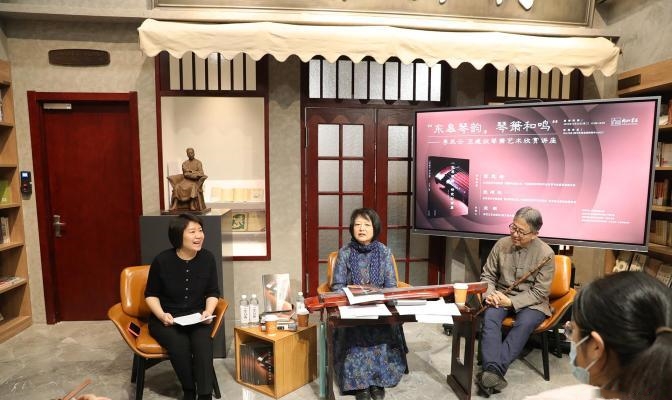Donggao Qin Yun Qin Xiao and Ming Guqin art appreciation lecture was held in Tianjin Neishan Bookstore
A lecture on the art of Guqin was held at the Neishan Bookstore in Tianjin on October 22.
It is understood that as one of the series activities of the second "Rongcheng · Hundred Flowers Art Week", this event invited Li Fengyun, Vice president of China Guqin Association, professor of Tianjin Conservatory of Music and Guqin performance educator, and Wang Jiaxin, professor of Tianjin Conservatory of Music, vice president of Tianjin Musicians Association and expert in dizi performance, to play and explain the Chinese guqin art.

It is reported that this activity through explanation and demonstration, let everyone listen to the music of Qin and xiao, the Guqin music art has a more comprehensive understanding and understanding. In the meantime, the two teachers also brought guqin to the scene to play. Ms. Li Fengyun played the "Long Love · Spring Boudoie", "Autumn Wind Ci", the guqin song "Yangguan Song" from the "Donggao Guqin Music", and Ms. Wang Jianxin played the "Falling Wild Geese in Pingsha" together with the guqin and xiao. Ms. Li also demonstrated the phenomenon of "different songs with the same name" (same pair of songs with different melodies) and "same song with different names" in traditional qin songs with examples from "Donggao Qin Score".
During the event, Professor Li Fengyun also shared the book "Research and Making Music Collection of Donggao Qinpu" published by Baihua Literature and Art Publishing House (Tianjin).
It is known that the Zen master Donggao traveled to Japan and trained many harp masters, becoming the founder of the Japanese harp science for 300 years. Donggao Qin Music can be regarded as an important example in the history of Sino-Japanese cultural exchange. In Japan, there are many versions of Donggao Qinpu, which has also been published in China. Professor Li Fengyun's "Research and Transcription Collection of Donggao Qinpu" draws on the knowledge of all families, and selects four of them for all transcription, comparison and research. Among them is a Catalogue of Qin Books written by Zhou Qingyun (1864-1933), a Nanxun native of Wucheng County, Huzhou, Zhejiang Province, who was the first to reveal the Qin Music of Donggao to the Chinese people.
It is reported that Professor Li Fengyun has compiled and published nearly 70 Qin songs (Qinqu) in the form of simplified and reduced characters. He has also written detailed musical experience and research findings, which gives guqin lovers a new learning experience. In addition, the book also presents the latest research results of Professor Wang Jianxin on the Zen master Donggao and the cultural exchanges between China and Japan, which makes the book have a certain historical value as well as a professional art.
 渝公网安备 50010702504639号
渝公网安备 50010702504639号